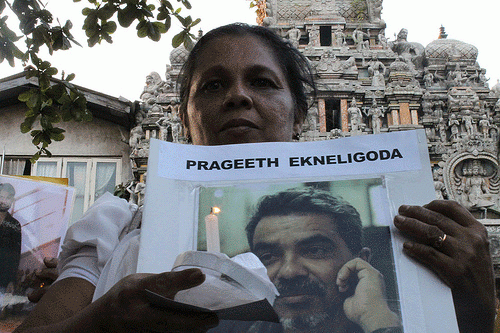Image: Sandaya Ekneligoda has been fighting for justice for years , but national institutions has not been able to bring the killers her husband to book.
The ratification by consensus of Resolution No 40/1 by the UN Human Rights Council has given Sri Lanka another two years in which to implement the commitments it made at this same forum over three and a half years ago in October 2015. The willingness of the international community to grant this extension is a reflection of its continuing reliance on the country’s commitment to work within the framework of a national reconciliation process in which international standards are met. The National Peace Council welcomes the extension and calls on the Sri Lankan government to fulfill its commitments within the framework of transitional justice that meets international standards.
We note that on both sides of Sri Lanka’s ethnic divide, parties have sought to prevent the government getting a further two-year extension to implement UNHRC Resolution 30/1 of October 2015. Tamil parties called upon the international community not to provide Sri Lanka with an extension of the time frame and have called for direct international intervention that bypasses the Sri Lankan government. On the other hand, the main opposition party called for Sri Lanka to withdraw as a co-sponsor of the resolution. They have been especially critical of the UN Human Rights Commissioner’s report which called upon the government to establish a full-fledged OHCHR country office, establish a hybrid court and for the international community to utilize universal jurisdiction principles to advance accountability in the absence of credible domestic processes.
The UN High Commissioner also noted “The importance of the separation of powers, the independence of the judiciary and other checks and balances in a democratic society was highlighted by a number of situations in 2018. The judiciary and independent commissions, including the Human Rights Commission, continue to play a vital role in strengthening reforms and cementing good governance in Sri Lanka.” We are confident that if the Sri Lankan government performs its duty through strengthened national institutions there will be no need for either universal jurisdiction or hybrid courts to become operational or for further international intervention in the form of a specialized new UN human rights office to be set up in the country. The present slow implementation of commitments made by the Sri Lankan government needs to be speeded up. In the run up to elections which will likely be politically and ethnically divisive we also appeal to the international community to practice do-no-harm principles in getting its message across.
-National Peace Council
